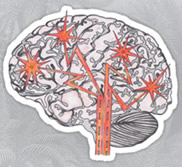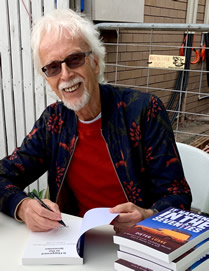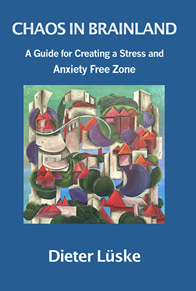useNature.com .... for Relaxation and Meditation
Manage Harmful Stress
Natural Health Lifestyle Online Magazine
Holistic Health & Lifestyle Information
Article: Manage Harmful Stress
Natural harmful stress management
... Article by Edeltraud Grace
Compiled by ... the editor of Use Nature, Dieter Luske N.D.-D.C.H.-D.M.H.-D.H
Author of Chaos in Brainland - Creating a Stress & Anxiety Free Zone
Active help for the HEART
These days the psyche of the modern human being is more burdened than ever before and, depending on the constitution and life situation, this stress poses a thread to health. The majority of the most frequent prescribed drugs in western societies are used to that stress-related illnesses, as in the case of antidepressants, tranquillisers, sedatives, sleeping pills as well as medicines for controlling high blood pressure. In the last decade, use of antidepressants and tranquillisers has more than doubled. The risks of misuse and over-medication are increasing, while the root of the problem remains quite untouched. And yet there are simple, natural methods to address unhealthy stress.
This article discusses the origins of a new therapy, the brainchild of French psychiatrist Dr. David Servant-Schreiber, for psychological and stress-related disturbances.
A stay in the Himalayan town of Dharamsala, the Indian domicile of the Dalai Lama and thousands Tibetan exiles, had set Dr. Servan-Schreiber thinking. The French medic and psychiatrist saw how people suffering from stress-related mental disturbances were treated, not with light therapy or valium; no such remedy was used. The treatment was of a different nature. This impressed Dr. Servan-Schreiber so much as to lead him to develop an easy to use stress-relief method together with a team of researchers and doctors. It can be used by anybody and is based on certain traditional treatment methods used in Tibetan medicine.
THE SIGNIFICANCE OF THE "EMOTIONAL" BRAIN
 To understand how this approach works one needs to know about the so-called "emotional" brain. This is located deep in the brain and differs significantly from the frontal cerebral brain in regard to its structure and its biochemical properties.
To understand how this approach works one needs to know about the so-called "emotional" brain. This is located deep in the brain and differs significantly from the frontal cerebral brain in regard to its structure and its biochemical properties.
However, this emotional brain is not only responsible (as the name might suggest) for emotions and feelings. It also regulates certain physiological functions like the heartbeat, hormone secretion, blood pressure, sleep, libido as well as digestion and the immune system. This gives us a clue as to why, when we are under severe stress, within seconds the heart starts to race, we break out in a sweat, our blood pressure and pulse rise, or control of the bladder and bowel can be lost. All these bodily functions are involuntarily controlled by the emotional brain.
OUR IMMUNE SYSTEM IS AFFECTED BY CHRONIC STRESS;
THE HEART TOO CAN "ACT UP":
The body also is steered by "accelerator" and "brake" systems. Both must function in a harmonious interplay.
Research has uncovered complex connections between the brain, the psyche and physiological reactions and demonstrates how the immune system is also affected and weakened by chronic psychological stress. The "killer cells" of the immune system, the first line of defence of our organism, go on the attack immediately against an invading pathogen. Like many other physiological functions, their activity is controlled by the emotional brain. Pleasant feelings such as are associated with harmony and wellbeing will stimulate the killer cells; stress, anxiety, fear, anger or depression will, however, inhibit their activity.
WHEN THE HEART FALLS APART
In certain stressful stituations our heart will over-react. Palpitation is the medical term for this unsettling and unpleasant attack.
The relationship between heart and emotional brain is key to understanding stress-related events in the body.
More importantly, the autonomic nervous system, which is of an involuntary nature, consists of two strands: the "sympathetic" system and the "parasympathetic" system. Both issue from the emotional brain and affect all organs of the body. The sympathetic nervous system controls the fight or flight response and, among other things, speeds up the heart rate. Dr. Servan-Schreiber compares the process to that of "accelerator and brake". The sympathetic nervous system accelerates, the parasympathetic system applies the brakes.
Both actions, however, need to form a harmonious interplay, which in medicine is called "coherence".
Modern man has increasingly lost the wonderful ability of adapting his way of responding to different situations. To negotiate the unpredictable turns in life, says Dr. Servan-Schreiber, one needs both a brake and an accelerator; the two need to be equally efficient and in flawless working condition in order properly to balance each other.
Should the heart go out of sync as can happen when feeling some painful emotion or as a result of stress, the accelerator increases the heart rate, while the "brake" fails. But we can learn to use the brake so that we do not become helpless victims in emergency situations.
THE POWER OF THOUGHT AND HOW THEY AFFECT THE HEART
So the "heart coherence" consists of the hearts ability to adapt of its own accord to certain situations. This is guaranteed only when phases of deceleration and acceleration are harmoniously and sensibly synchronised-something that is no longer the norm with most people today.
Dr. Servan-Schreiber`research demonstrates that we can all learn to optimise the coherence of our heart. This is at odds with many theories so far, but it does work.
The impact that our thoughts and feelings have on heart coherence was clearly shown in test subjects whose heart reactions were displayed on a monitor. Changes in the heartbeat became visible almost instantly!
When we have fearful or troubling thoughts for instance, the emotional brain "steps on the accelerator", the graph of the heartbeat becomes erratic, almost chaotic. However, this curve normalises very quickly when the test subject pictures something very beautiful and cheerful, and directs all attention to the heart region. Joy, gratitude and love bring the heart rhythm back to normal; the parasympathetic nervous system, the "brake pedal", steps into action.
OUR THOUGHTS HAVE A CLEAR INFLUENCE ON THE HEART. A USEFUL FACT WITH PROSPECTS FOR SPECIFIC TREATMENT METHODS.
HALTING RAPID DESCENT INTO CHAOS
Like a muscle that wastes away when not being used, the "brakes" deteriorate depending on how stressed we are and, unfortunately also, the older we get. The activity of the parasympathetic nervous system naturally declines with age.
In contrast, the accelerator is always in action, analogous to a speeding car that can longer slow down. This would be a dire situation on the road; it is of course just as dangerous for our organism and can lead to a number of health problems.
If we ecercise the parasympathetic system on a regular basis, like an athlete trains his muscles, we gradually regain the ability to apply the "brake" at any time to halt the runaway descent into chaos.
Dr. Servan-Schreiber and colleagues at the HeartMath Institute in California tested a method which is targeted specifically at the heart and its rhythm. The purpose of the exercise is to optimise the heart`s ability to adjust to any situation. This in turn "feeds back" to the emotional brain, "telling" it that all is well.
As with all relaxation techniques, we should first consciously retreat inwards. This works best, at least for the beginner, if we withdraw from the noisy daily round and try to leave all thoughts and worries behind.
First step:
Start breathing in and out very slowly and deeply. Try to follow every breath consciously. This in itself will stimulate the parasympathetic system- something which has been known for a long time and used in Yoga for example. The novel element of this technique is the area of the heart as you continue to breath.
Second step:
Try to imagine or visualise how your breath goes directly into your heart and fills it up completely. Picture before your inner eye, how the inhaled oxygen streams through the heart and how extremely beneficial this is for your heart. Every person will use a different image which helps him to imagine the beneficial effect of the oxygen. As you exhale imagine how everything that is painful or depressing leaves the body with each expiration.
Third step:
Now try to create with your breath a feeling of warmth in your heart. Even if you cannot achieve this comfortable feeling straightaway, this will change with time. Emotions of love and gratitude can be very helpful. It is not important what generates the feeling of love, whether we think of a loved one or an animal which is dear to our heart; nature lovers may remember a beautiful landscape or a magnificent sunrise; religious people imagine a loving force which encompasses the whole universe.
Every human being is different, so too the images that mediate love and gratitude will be different for each individual.
Astonishing results without medication.
This simple exercise, when performed on a regular basis, can yield astonishing results.
The practice of coherence has inestimable value for both psychology and cardiology. This is shown in a case study reported by Dr. Servan-Schreiber. Patients with severe heart failure, who suffered not only from familiar symptoms like breathlessness and tiredness, as well as having oedema, but also from anxiety and depression, were taught the coherence exercise. Compared to a control group treated with conventional medication for heart failure, the results were unambiguosly superior.
Large concerns like Shell, Hewlett-Packard and Unilever enrolled their top executives in a programme to practise coherence of the heart rhythm. They practised the method for 30 minutes five days a week for one month. The result: Within a few weeks their symptoms of stress- palpitations, insomnia, muscular tension and exhaustion- improved significantly. The participants enjoyed their newly acquired ability to control their reactions and handle their emotions more sensibly. Needless to say, this also had a beneficial effect on their relationships.
There were other astonishing results: One month into the programme the blood pressure dropped to values that could only be achieved if the participants had lost the equivalent of ten kilograms in weight or had followed a strict salt-free diet. In the female particicpants the hormonal balance was also recognisably improved.
These changes demonstrate a profound rebalancing of physiological processes in the body- and this was all achieved without drugs!
Another study showed convincingly how closely the emotional brain is linked to the immune sytem. The participants of this study were asked to think of something very unpleasant, something that makes them angry. Even though it was not immediately noticealbe to the person, even one single bad memory could often trigger a chaotic heart rhythm which lasted for several minutes. After a bout of anger, physiological resistance against viruses, bacteria and fungi was reduced on average by about six hours. These facts are thought-provoking especially in the context of public health considerations.
The health benefits of improved heart coherence which can be achieved through regular practice are truly impressive:
Relieving anxiety and depression, reducing blood pressure, stimulation of the immune system, slowing down the ageing process and rejuvenation of the body`s physiology.
The wide range of these beneficial effects can indeed reverse physical and psychological damage caused by stress.
Conclusion:
Stress can make us ill. Therefore it is not surprising that dealing with it within ourselves can help us to heal as soon as we become determined and invest the necessary amount of time to exercise coherence.
Chaos
In states of stress, anxiety or depression, the heart rate varies irregularly, it becomes "chaotic."
Coherence In states of well-being, gratitude or compassion, the heart rate varies regularly, it becomes "coherent."
Advice: The exercises described in this contribution naturally are no replacement for treatment prescribed by a doctor. Please seek advice of your physician.
NLP and Flower Essences can also contribute a great amount to deal with stress, help recovery from stress, anxiety and depression.
Read also our articles on Brain Plasticity
Article provided by : Edeltraud Grace
Compiled by ... the editor of Use Nature, Dieter Luske
* Disclaimer - Any general advice given in any article should not be relied upon and should not be taken as a substitute for visiting a qualified medical Doctor.
Dieter Luske - Author
useNature Editor
Overcome
Chaos in Brainland
It happened in the seventies
Intriguing story of risk-taking & self-discovery
Healing with Sound
Alchemix
Recording Studios
Sound Production:Recording - Mixing &
Mastering Services
Voice Overs
© 1998 - 2025 useNature.com: Australia - Dieter Luske - Writer - Creative Lifestyle Portal - Natural Holistic Health - Books & Art | Site Map - Terms | Free Alpha Music
*Disclaimer: Information provided is intended for general/personal use only. It should NOt be understood as medical advice.




